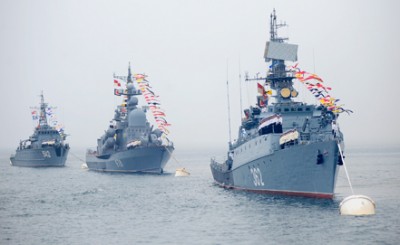US-Russia Confrontation in the Arctic and the Battle for Oil. Russia’s Territorial Claims of the Arctic Shelf

The map below shows the territorial and military situation in the Arctic and describes the Russian military devepolments in the region. This product is relised due to your support. Help produce interesting content and join our struggle by donating via PayPal: [email protected] or via: http://southfront.org/donate/
The Arctic shelf is the one of the reasons why the United States would like to destabilize Russia. The Arctic contains up to 30 percent of the world’s oil and gas. As technologies have advanced, more and more of hydrocarbons have become recoverable and viable. The stretch of sea can also provide new shipping lanes for goods traveling between Asia and America and Europe. Hoping to get its hands on the entire Arctic, Washingtonis militarizing the region and reportedly wants to bring regime change in Russia.

In 2014, the Arctic Joint Strategic Command “North” was established by the Russian military on the basis of the North Fleet, then reinforced with manpower and hardware from the Western, Central and Eastern Military Districts stationed in circumpolar areas. Russia is also in the process of building of 10 airfields and 13 air-defense radar stations in the Novoribirskie Islands, Frans Josef Land, Novaya Zemlya and other points of Russian Arctic.The ground element of the command will incorporate two Arctic motorized infantry brigades, Air Defense forces consisting of Pantsir-S1 missile and other systems and the Northern Fleet will become its main striking force. Furthermore, by 2017 the Tiksi airport complex will be operational, and it will be garrisoned with upgraded MiG- 31 interceptors
The next important thing is that Russia has established the Independent Military Group of Aerospace Forces in the Arctic region. The Aerospace Forces as a new branch of the military was activated on the 3rd August. They have been formed by the merger of the Russian Air Force (VVS) and the Russian Aerospace Defense Forces (VKO). The VKO is responsible for providing airborne protection of the country; to be able to defeat opposinf forces using both conventional and nuclear weapons; to provide aviation support for the other armed services; protect against ballistic missiles; provide early warning; launch military and dual-use satellites; maintain military satellites; and monitor, identify, and protect Russia from space threats.
The U.S.-Canada North American Aerospace Defense Command (NORAD) is a vital opponent of Russian VKO in the Arctic. Officially defensive combined organization NORAD publicly states that it is ready to hit any targets and prevent threats in zone of its responsibility. Indeed, the defensive U.S.-Canadian organization claims its zone of responsibility includes all Arctic region including Russian coast.
We give the detailed data about the Northern Fleet to showcase the approximate power of the Arctic Joint Strategic Command “North”.
NORTHERN FLEET OF THE RUSSIAN FEDERATION
The Northern Fleet (NF) is an operational-strategic association of the Navy of Russia. It includes:
Surface fleet:
- Aircraft carrier – 1
-
Cruiser – 4
-
Frigate – 9
-
Small warship – 10
-
Minesweeper – 11
-
Large landing craft – 4
- Assault landing craft – 4
Submarine fleet:
-
Strategic heavy missiles underwater cruiser – 10
-
Multi-role cruise-missile-carrying nuclear submarine – 4
-
Nuclear-powered attack submarine – 14
-
Atomic deep submergence station – 7 (no pukka gen)
-
Diesel-electric submarine – 8
-
Experimental submarine – 1
Auxiliary fleet:
-
Nuclear maintenance ship – 4
-
Repair ship – 9
-
Special liquids tanker – 2
-
Shuttle tanker – 5
-
Sar vessel – 2
-
Medical service vessel – 1
-
Recon ship – 3
SouthFront Team is digging deeply to improve our products. The next update of the Arctic map will include additional information about the military forces and developments in the region. Wait it in the nearest time.

